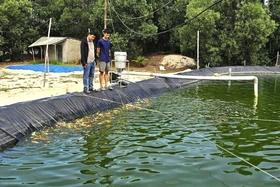{title}
{publish}
{head}
Quang Tri is a province with a narrow, short, and steep terrain, featuring a 75 km coastline, a dense river system, and a complex climate. As a result, Quang Tri is one of the provinces most frequently affected by various types of natural disasters, with significant intensity and frequency. On average, the province faces around two typhoons per year, along with floods, inundation, droughts, saltwater intrusion, flash floods, landslides, and other impacts related to climate change.

The construction of the coastal dike system in Vinh Thai commune, Vinh Linh district, plays a crucial role in preventing coastal erosion. Photo: T.N
Recent observational data reveals that extreme weather phenomena have become more complex, unpredictable, and inconsistent compared to previous years, with stronger intensity and higher frequency. This has resulted in increasingly severe natural disasters, both in terms of intensity and frequency, causing significant damage to state and public assets in the province. The effects of climate change are becoming more pronounced, impacting all sectors of society.
For instance, rising temperatures and droughts are gradually depleting sources of water from rivers, lakes, and underground aquifers that supply raw water for daily use, leading to water scarcity in many areas. Additionally, unusual floods and heavy rains have caused inundation in low-lying regions, especially in the plains, and severe soil erosion and landslides in mountainous and riverside areas. Coastal erosion is also a growing concern. Statistics indicate that up to 3,000 meters of the Quang Tri coastline are eroding, mainly in the coastal sections of Thai Lai, Tan Mach, Thu Luat, and Tan Hoa villages in Vinh Thai commune, Vinh Linh district, which is threatening dike systems, residential land, houses, and agricultural areas.
To proactively respond to the adverse impacts of climate change, the Quang Tri Provincial People’s Committee issued Plan No. 58/KH-UBND on March 17, 2021. This plan identifies three key areas of action, focusing on seven priority sectors to enhance the resilience and adaptive capacity of communities, economic sectors, and ecosystems. The goal is to reduce vulnerability and risks from climate change impacts while integrating climate adaptation into the province’s development strategies, plans, and socio-economic development plans.
To implement these actions, the provincial government has outlined measures to sustainably manage and use forest resources, protect biodiversity, and enhance ecosystem services. This includes investing in the development of infrastructure for coastal and island communities, particularly in the Con Co Island area, based on disaster risk zoning and climate change scenarios. Priority is given to the construction of green infrastructure, the development of urban greenery, and upgrading flood drainage systems to mitigate flooding risks in urban areas such as Dong Ha city and Quang Tri town.
By 2050, the province aims to effectively manage water, land, and environmental quality resources. It seeks to continue developing smart, modern agriculture that is resilient to climate change and adds high value. The plan includes regulating and allocating water resources efficiently and enhancing integrated management to meet the water needs of various sectors and localities.
Monitoring the extraction, use, and protection of water resources will be critical, as will addressing water pollution and conducting assessments of the carrying capacity of rivers, lakes, and other water bodies. Efforts will also focus on optimizing the use of unused land, floodplain areas, and coastal lands for forest development, urban green space, and industrial zones.
The province will also invest in upgrading meteorological, hydrological, and disaster prevention infrastructure, and add new monitoring stations, especially in areas prone to high tide surges, flash floods, landslides, and flooding. A detailed risk assessment and updated climate and water resource reports will be vital for future planning.
Timely and effective disaster prevention measures will focus on high-risk areas prone to typhoons, floods, flash floods, landslides, and droughts, as well as mitigating saltwater intrusion, coastal erosion, and rising sea levels. Infrastructure for disaster prevention, including flood control, will be built or upgraded in areas frequently affected by storms and floods.
The plan includes reinforcing dikes, dams, and flood protection works to ensure resilience against floods and storms. It also prioritizes securing the safety of key water and coastal infrastructures, such as reservoirs and dikes, while developing storm shelter areas for vessels in line with regional plans, including those for Con Co Island.
Urban planning will prioritize the relocation and resettlement of vulnerable communities from high-risk areas, especially those prone to extreme weather, erosion, or landslides. Measures will be taken to ensure safety for residents, particularly the most vulnerable, in areas often affected by climate extremes. The construction of disaster-resistant homes and community shelters will be part of this effort.
Additionally, strengthening search and rescue capabilities, ensuring social order and security, and proactively preventing disaster scenarios will be essential to safeguard public life and property from climate change-induced disasters.
To concretize the contents of Decision No. 1055/QD-TTg dated July 20, 2020, by the Prime Minister regarding the National Plan for Climate Change Adaptation for the period 2021-2030, with a vision to 2050, the Quang Tri Provincial People’s Committee issued Plan No. 58/KH-UBND on March 17, 2021. This plan identifies three key tasks and solutions, focusing on seven priority areas to strengthen the resilience and adaptive capacity of communities, economic sectors, and ecosystems. The goal is to reduce vulnerability and risks from climate change impacts while promoting the integration of climate adaptation into the province’s development strategies, planning, and socio-economic development plans.
Additionally, the Provincial People’s Committee issued Plan No. 139/KH-UBND on July 14, 2022, to implement the climate change response provisions under the 2020 Environmental Protection Law. As part of this effort, Quang Tri Province has actively worked to improve climate change adaptation by contributing to the national legal framework on climate change.
Efforts have focused on raising awareness of climate change adaptation, with the Department of Natural Resources and Environment (TN&MT) and local authorities organizing outreach events to disseminate policies and laws on environmental protection and climate change response. These initiatives include annual observances such as World Environment Day, Vietnam’s Sea and Island Week, World Oceans Day, World Meteorological Day, and Earth Hour, all conducted through diverse, engaging methods.
To further strengthen the province’s adaptive capacity, Quang Tri has implemented measures for managing, exploiting, and protecting groundwater resources in the lowlands and developed plans for river basin management, specifically for the Ben Hai and Thach Han rivers.
The provincial government has also approved areas with restricted groundwater extraction and established regulations for groundwater use. Entities involved in water resource management must install, monitor, and operate devices for tracking resource extraction, with real-time data reporting to the TN&MT Department.
In the agricultural sector, Quang Tri is advancing crop restructuring, applying science and technology in production, and researching and introducing new crop and livestock varieties that are climate-resilient. The province is also promoting the use of high-tech solutions, organic farming, and sustainable agricultural ecosystems. Aquaculture is being expanded, particularly focusing on diverse species, farming methods, and developing specialized areas for shrimp farming.
The province is also prioritizing forest protection, development, and biodiversity conservation by enhancing the management and sustainable use of forestry resources.
In terms of infrastructure, Quang Tri is upgrading and building road and waterway systems in areas frequently affected by flooding. The provincial government regularly instructs relevant agencies to review and update construction standards to consider the impacts of climate change. Investments are also being made in transport infrastructure for disaster response, such as rescue and evacuation routes. Additional projects include dredging the channels at ports like Cua Viet and Cua Tung. The province is also focused on strengthening urban infrastructure to ensure sustainable urban growth that is resilient to climate change, creating a safe living environment for city residents.
Tan Nguyen - Ngoc Mai

QTO - In Quang Tri, clean agricultural stores may not flaunt flashy signs or wide storefronts, but they are quietly becoming trusted places where consumers...

QTO - In a quiet village in central Vietnam, Le Minh Duc, 26, has turned his passion for ornamental fish into a promising startup, the first Koi breeding...